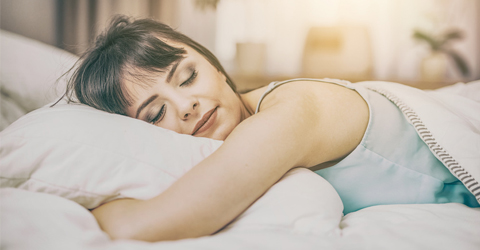

Several years ago, I didn’t give sleep much time. If I logged six hours a night, that was good enough. Who really has time to sleep anyway?
That’s what I used to say. Now sleep is my top health priority. I had always known that sleep is important, but until I started writing more about it as a journalist, I didn’t realize how important it was. Some experts I’ve interviewed have said that sleep is crucial for health. That’s because insufficient sleep—the National Sleep Foundation recommends adults 18 to 64 years old get seven to nine hours a night[1]—raises the risk of numerous diseases, including diabetes, cardiovascular disease, obesity, even depression, according to the Centers for Disease Control and Prevention.[2]
In recent years, more studies have shown a connection between insufficient sleep and Alzheimer’s.
But here’s what finally convinced me to change my tune about sleep: In recent years, more studies have shown a connection between insufficient sleep and Alzheimer’s.[3] I’m fortunate that I don’t have many diseases in my family, save for Alzheimer’s. Both of my dad’s parents suffered from it, and I’m now seeing its effects on my dad.
I’d already been doing everything to lead a brain-healthy lifestyle, including exercising daily and eating a plant-based diet, but sleep was the missing link. So two years ago, I made higher quantity and quality slumber a priority. Below are seven strategies that have helped me log sounder sleep:
- Nix devices 30 minutes before bed: Sleep doctors have told me they recommend putting a moratorium on screen time 30 to 60 minutes before bed (these devices emit blue light which can mess up sleep)[4] so I’ve adopted the 30-minute rule. I then don’t look at a digital device, namely my laptop, until the next morning (and usually not until an hour after I get up). I also don’t keep any device, even a TV, in the bedroom.
- Read before bed: Setting the mood for sleep means being relaxed, and while some people like to take a bath or meditate, I prefer to read for at least 20 minutes every night before turning off the lights.
- Play white noise: I’m a light sleeper. Not only do I hear every noise around me, I have such a monkey mind that it’s often hard to settle down to sleep. I have found that using a white noise machine by my bed helps me to drift off. Many noise generators are commercially available and well worth the investment. There are also a number of free or very inexpensive white noise apps that do the same thing.
- Maintain separate bedrooms if appropriate: One of my biggest sleep disruptors? My husband’s snoring. No matter how many times I would nudge him into a different position, he would continue to rock the room, which often resulted in sleepless nights for me. Finally, I proposed a radical idea: Sleep in separate bedrooms. It took a little while to get used to, but I’m now sleeping much more soundly. This strategy works well unless we’re traveling and have to share a room, not to mention a bed. That’s where a free white noise app on my iPhone, placed far away from the hotel bed, comes in handy.
- Keep a notepad by the bed: A racing mind is often the reason I either can’t fall asleep or more commonly, can’t stay asleep. That’s why I keep a notepad by my bed. When too many thoughts are keeping me awake, I find that writing them down helps to get them out of my head, allowing me to rest easier.
- Get out of bed if you can’t sleep: In the past, if I were to wake up in the middle of the night, I’d turn on my light, even use a headlamp so as not to disturb my husband, and read in bed. Now, I leave my bed and tiptoe to the family room where I read until my eyes are sleepy. Once they start feeling heavy, I move back to the bed, repeating this as often as I need to until I fall back to sleep. I learned this trick from sleep experts, and it works like a charm. Granted, it’s not always fun to get out of bed in the middle of the night, but it’s helped remove anxiety about sleeping when I crawl into bed.
- Stay consistent: Nothing messes me up more than being off my sleep schedule. That’s why I stick with a consistent a schedule as much as possible, including on the weekends and when traveling. Even if I have to stay up later one night, I still wake up at my normal time the next day—I’m usually stirring before my alarm clock goes off—and may then take a 15-minute power nap that afternoon.
My sleep health is still a work in progress. However, I’m happy to report that I’m regularly sleeping close to seven hours a night, and though I still have restless nights, they’re not nearly as frequent as they once were. Skimping on sleep will never again be an option for me.
References
Copyright 2026 Center for Nutrition Studies. All rights reserved.
Deepen Your Knowledge With Our
Plant-Based Nutrition
Certificate
Plant-Based Nutrition Certificate
- 23,000+ students
- 100% online, learn at your own pace
- No prerequisites
- Continuing education credits











